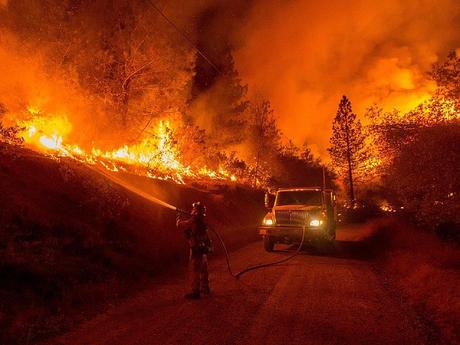A scientific group pronounced the year 2018 as the fourth warmest year on record on Thursday. It becomes 4th in a row joining other three extra hot years, i.e., 2015, 2016 and 2017. There seems no sign of temperatures dipping down, and that let us doubt whether Earth may able to return from this upward leap of warmth in our lifetime or not.
According to Zeke Hausfather, a research scientist with Berkeley Earth, which released the findings, 2016 was the warmest year on record for both the Earth’s land and oceans, and that was because of a powerful El Nino event.

“2018 is consistent with the long term warming trend,” Hausfather said. “It’s significantly warmer than any of the years before 2015. There’s still this big bump up after 2014, and 2015, 2016, 2017, and 2018 are all in a class of their own.”
Earlier this month a European Union body, The Copernicus Climate Change Service also proclaimed 2018 as the fourth warmest year on record. A researcher at the University of York, Kevin Cowtan who also keeps an influential temperature dataset, agreed with the ranking.
“Our results to November clearly put 2018 in 4th place, significantly warmer than 2010 in 5th,” said Cowtan. “The 11 hottest years on record have all occurred since 2005.”
However, NASA and NOAA, the U.S.’s two top temperature records keepers, not yet released their findings due to the current government shutdown. Last year on January 18 both the agencies released assessments for 2017′s temperatures where NASA called 2017, the second warmest and NOAA, the third.
Gavin Schmidt, who heads the NASA’s agency office that tracks the temperature records, tweeted that their release has been “indefinitely postponed” due to the shutdown while NOAA said that it would examine the status of the 2018 temperature release.
However, a coordinated release had been planned for January 17 by Berkeley Earth and the U.S. government agencies. Once that happened, Berkeley Earth decided to release its numbers, said Hausfather.
As per Hausfather, there will be no disagreement about the rankings this year by any party based on the other temperature datasets with the data through November and thus only one month remaining to add. NASA’s Schmidt also tweeted back in October that 2018 would undoubtedly be the 4th warmest year. Hausfather further added,
At this point, it would be almost impossible for 2018 not to be the fourth warmest in all the records.
2018 witnessed many extreme weather events like devastating California wildfires, extra hot summer in Europe. Berkeley Earth found, 29 countries recorded their hottest years including European countries like Germany and France and also Middle Eastern nations like the United Arab Emirates and Oman. Remarkably, Antarctica also saw its record warmest year, found by the group.
The last several extra warm years are highly significant both from a political and policy perspective. NASA’s Schmidt tweeted that they were at or above a 1 degree Celsius, or 1.8 degrees Fahrenheit, increase above so-called “preindustrial” temperatures or temperatures from the later part of the 19th century.
In Berkeley Earth’s dataset, the last five years are all above 1C and in the National Oceanic and Atmospheric Administration dataset, 2018 is trending slightly under it. Either way, this matters. The scientists warned about increasingly dire consequences as soon as the Earth reaches 1.5 C or 2C, temperature targets that are both flagged in the Paris climate agreement 2015.
Many land areas are already affected at this point as land surfaces are warming quicker compared to the ocean. However, the oceans are also heating up and found to be the warmest on record in 2018.
Berkeley Earth projects that 2019 will also be warmer than every year and thus temperatures will once again rise to 1 C.
“It’s unlikely at this point that we’ll have a situation where temperatures dip back below that, at least for the globally complete datasets,” said Hausfather. He termed the current temperature range — facing more extreme heat events, alarming wildfires, and major coral bleaching and death around the world, among other climate-linked occurrences — a “new normal.”
Hausfather has been personally affected while living in the Bay Area. “We have a 1 and a half year old baby,” he said. “Earlier this fall after the Camp Fire, when the air quality was worse in San Francisco than it was in Beijing, we had to stay inside, bought an air purifier, had to wear masks outside.”
“We’ve also seen some crazy extreme heat events,” he continued. “It reached 100 degrees in San Francisco two weeks after the baby was born….and obviously none of us have air conditioning, it’s San Francisco. So in general we’ve certainly noticed that these extremes appear to have become more common.”

